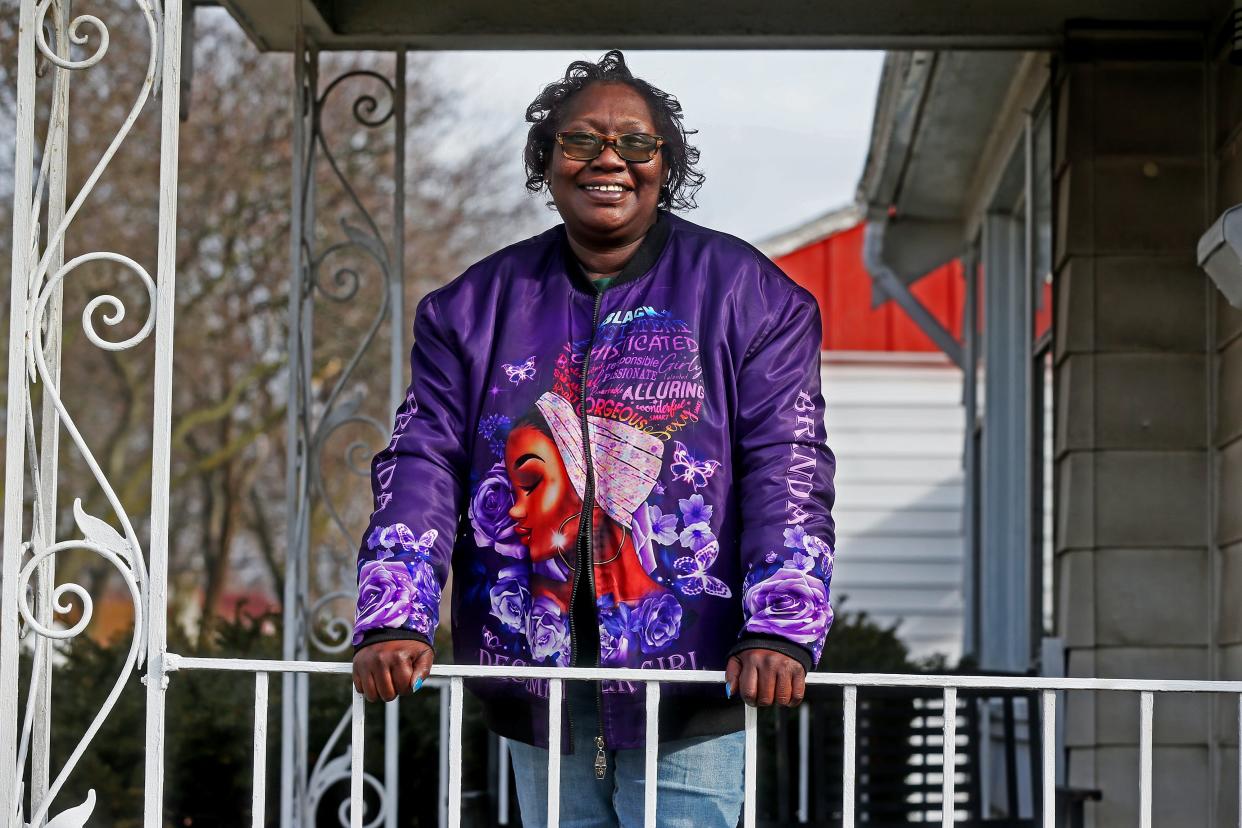From homeless to homeowner: How Movin' Out's downpayment program helps people with disabilities get a piece of the American Dream.

Seven years ago, Brenda Cogshell never thought she would become a homeowner.
Battling addiction, she was homeless and often felt hopeless.
However, Cogshell's participation in the Movin' Out homeownership program in 2022 led her to purchase what she calls her "dream home."
"I didn’t think I was going to get this house," Cogshell recalled. "The realtor was like, ‘Don’t get your heart set.’ But I fought for this house."
And Movin' Out, she said, fought for her. The Madison-based organization, which was founded in the 1990s, provides housing assistance and advocates for people with disabilities all over the state to live safely and independently. Cogshell said the program gave her $10,000 to help with the downpayment costs.
And more importantly, it gave her the guidance and support to do something she didn't think was possible.
"I never owned a home before, never thought I would qualify to own a home," she said. "I thought I was going to be renting for the rest of my life."
Cogshell struggled in her early years
Cogshell was born in Bakersfield, California. Shortly after, she moved with her family to Milwaukee.
She said she and her five siblings had a wonderful childhood.
"She was a single mom, but she did a lot for us," Cogshell recalled. "We traveled, we went on vacations."
As a teenager, Cogshell started smoking cigarettes, drinking, and trying to "fit in." Even though she graduated high school, Cogshell said those early rebellious moments eventually spiraled into addiction and homelessness.
She had a son, who was taken away when he was five, due to her addiction.
After 15 years, Cogshell's mother and boyfriend finally encouraged her to go to treatment and get sober. After that, she stayed in a shelter. And while in the shelter, Cogshell was accepted into the Guest House, a charity that provides housing, trauma-informed counseling and education to help people become independent and permanently housed.
Through Guest House, Cogshell was able to get disability benefits and move into an apartment. Her case manager eventually helped her obtain housing through the Housing Authority of the City of Milwaukee.
Even though she was finally in a place of her own, Cogshell said it took perseverance to maintain her sobriety.

Need more help with mental health questions? The Milwaukee Resource Guide is here to help. Have something you want answered? Submit a question.
"On (North) 31st (Street) and (West) Sheridan (Avenue), I stayed in an apartment building and everybody there did drugs except me, and I was recovering," she said.
Then, while living in an apartment on North 23rd Street and West Center Street, she said she had to deal with mice.
But Cogshell made do. She adopted a cat named Spot from the Humane Society to help her with the mice.
And when her sister said she should attend a homeownership class hosted by Movin' Out, she did.
Movin' Out focuses on independent living for those with disabilities
Roughly a year ago, Vivien Rayam started working at Movin' Out as the director of the homeownership and counseling program, where she helps people with disabilities become homeowners.
Rayam and Movin' Out Executive Director Kathryne Auerback, both agree: affordability and accessibility are the most common barriers to homeownership for people with disabilities.

Rayam said many people with disabilities live on fixed incomes and with housing prices still high — and interest rates also high — they struggle to afford the significant up-front costs.
Those who work also struggle. People with disabilities often take lower-paying jobs and they sometimes make less than their counterparts without disabilities. Federal and state laws allow employers to pay people with disabilities below the minimum wage if their disability, "impair(s) their ability to perform their work."
Auerback also noted that finding a home with accessible features can be difficult.
"I just moved into a very, very old house with super narrow doorways," she said. "There is no way someone could live in this house with mobility challenges. The doors are not wide enough for a wheelchair to get through and they’re probably not even long enough for a walker."
Accessibility accommodations, such as installing grab bars, widening hallways, lowering countertops, installing accessible appliances, adding a stair lift, constructing wheelchair ramps and modifying bathrooms can cost an estimated $27,000 on the low end, according to Better Homes & Gardens.
Rayam explained there are also additional challenges for those who may have a mental health illness or intellectual/developmental disability.

"Even as someone who works within the housing industry, it can be an intimidating process," Rayam admitted.
But, they said, it's worth it.
The organization's downpayment assistance program helps people alleviate many of the up-front costs associated with buying a home, such as homeowners insurance, property taxes, inspections, appraisals and more. It is part of the organization's larger homeownership program that helps people with disabilities save for a downpayment, improve their credit, gather paperwork, find grants and find a home.
In addition to wealth-building, Auerback said people with disabilities who can safely live independently are often happier and more fulfilled.
"Stable housing is shown to lead to better outcomes in health, education, employment and just about every facet of life," she said. "Homeownership can be an important factor in housing stability."
‘It can happen for anyone’
These days, Cogshell suffers from weak leg syndrome, diabetes and fibromyalgia -- ailments she attributes to her addiction.
But she credits her immediate family, the family she made in recovery and her partners through Movin' Out, for helping her stay on track. Every time the organization sent her paperwork, she would fill it out and send it back. Eventually, the only thing she could do was wait.
"When the guy called me and told me I had been approved, I was like ‘what!?’ And I did some cartwheels and stuff," she said, laughing.
Her case worker at Movin' Out had helped Cogshell receive assistance through the Housing Choice Voucher Homeownership program, along with the Movin' Out grant.
Her closing costs, she said, were $27.19.
Cogshell moved in right away, grateful to be in a new environment.

"My whole perspective on life changed," she said. "To go from 23rd and Center to the pressures of the hood to now my spot? It’s like I’m safe now," she said.
As she embarks on her new homeownership journey, she said she hopes to fill her home with family. After reconnecting with her son 11 years ago, she discovered she had become a grandmother. Now she said she is working on preparing a room for the girl.
"It’s a community of people that love me and see the change, the fight that I fought," she said. "I know there is some work that needs to be done around the house and luckily, I got family members that know how to do some things and are willing to help out."
"They’re so proud of me," she said, grinning ear to ear.
Last November, Cogshell celebrate nine years of sobriety. This November, she will add a new milestone: one year of homeownership.
"I didn’t think I was ever going to get that far, to tell you the truth," she said. "But I would want people to know that (homeownership) is possible. It can happen for anyone."

Need more help with housing questions? The Milwaukee Resource Guide is here to help. Have something you want answered? Submit a question.
Talis Shelbourne is an investigative solutions reporter covering the issues of affordable housing and lead poisoning. Have a tip? You can reach Talis at (414) 403-6651 or tshelbourn@jrn.com. Follow her on Twitter at @talisseer and message her on Facebook at @talisseer.
This article originally appeared on Milwaukee Journal Sentinel: Movin' Out's downpayment program helps people with disabilities

